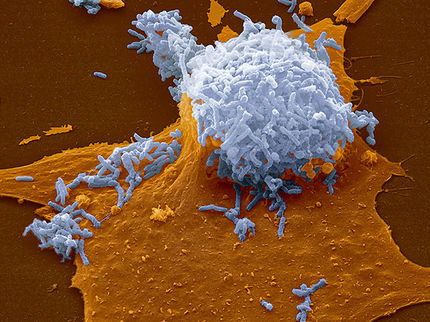Multi-drug resistant infections rising in children
Antibiotic-resistant Acinetobacter baumannii infections, one of the most common hospital-acquired infections in children across the United States, are on the rise, according to results of a recent study.
"Acinetobacter are bacteria known to cause serious infections and notoriously difficult to treat because of growing antibiotic resistance. The bacteria survive for long periods in the environment," said study primary author Dr. Latania Logan, chief of pediatric infectious diseases and associate professor of pediatrics at Rush University Medical Center.
The research examined national and regional trends of antibiotic resistance in clinical specimens over a 13-year period. The data was taken from The Surveillance Network Database, a network of 300 laboratories distributed throughout the U.S. and is compiled by the Centers for Disease Dynamics Economics and Policy in Washington, D.C.
Children with chronic conditions are at higher risk of infection
Because A. baumannii is an infection caused by bacteria that takes advantage of patients with compromised immune systems, children with a chronic condition are at a higher risk of infections of the lung, urinary tract, or other sites after surgery, intubation, trauma, or catheterization.
The amount of A. baumannii samples in infected children that were resistant to the antibiotics cephalosporin and carbapenem increased between 1999 and 2012 overall. However, the authors of the study noted a slight decline after a peak in 2008. Antibiotic stewardship guidelines released in 2007 or infection control guidance specifically designed to combat multi-drug resistant A. baumannii in health care settings may have been related to the decrease.
"While we are encouraged by the slight downtrend in resistance after 2008, there is still an overall increase in these infections. Further studies are needed to assess the most effective prevention strategies in children," Logan said.
'A perfect storm' of drug resistant infections
A. baumannii has numerous ways that protect it from antibiotics. The bacteria are able to protect themselves by using genetic adaptations that support survival in dry, harsh environments, and additionally have in place several mechanisms to render antibiotics ineffective. In this situation, "a perfect storm" results, Logan said. As a result, highly resistant A. baumannii infections are increasingly being reported worldwide.
The study results show that the number of cephalosporin resistant A baumannii increased from 13.2 percent of infections in 1999 to 23.4 percent in 2012, whereas the number of carbapenem resistant A baumannii increased from 0.6 percent in 1999 to 6.1 percent in 2012. From 1999 to 2012, the proportion of cephalosporin resistant and carbapenem resistant bacteria among all A baumannii increased each year by 3 percent and 8 percent, respectively After 2008, a downward trend was observed, but resistance remained higher than the 1999 baseline.
"It is encouraging to see the downtrend after 2008, but we need to continue to monitor," said the study co-author Dr. Sumanth Gandra, a resident scholar in the Center For Disease Dynamics, Economics & Policy, an independent research initiative based in Washington, DC and New Delhi, India.
Original publication
Latania K Logan, Sumanth Gandra, Anna Trett, Robert A Weinstein, Ramanan Laxminarayan; " Acinetobacter baumannii Resistance Trends in Children in the United States, 1999–2012"; J Pediatric Infectious Diseases Society; 2018
Most read news
Original publication
Latania K Logan, Sumanth Gandra, Anna Trett, Robert A Weinstein, Ramanan Laxminarayan; " Acinetobacter baumannii Resistance Trends in Children in the United States, 1999–2012"; J Pediatric Infectious Diseases Society; 2018
Other news from the department science

Get the life science industry in your inbox
By submitting this form you agree that LUMITOS AG will send you the newsletter(s) selected above by email. Your data will not be passed on to third parties. Your data will be stored and processed in accordance with our data protection regulations. LUMITOS may contact you by email for the purpose of advertising or market and opinion surveys. You can revoke your consent at any time without giving reasons to LUMITOS AG, Ernst-Augustin-Str. 2, 12489 Berlin, Germany or by e-mail at revoke@lumitos.com with effect for the future. In addition, each email contains a link to unsubscribe from the corresponding newsletter.
Most read news
More news from our other portals
Last viewed contents
Researchers find potential treatment for Huntington's disease - Better understanding of synaptic activity may support 'use it or lose it' hypothesis
American Peptide Company Announces Expansion of Its GMP Manufacturing Facility - Company expands capacity to accommodate large scale peptide production for growing customer base

Mystery of heart repair solved - New mechanism of cell communication found

Liquid crystal liver - First and new realistic 3D model of the liver lobule since the year 1949























































